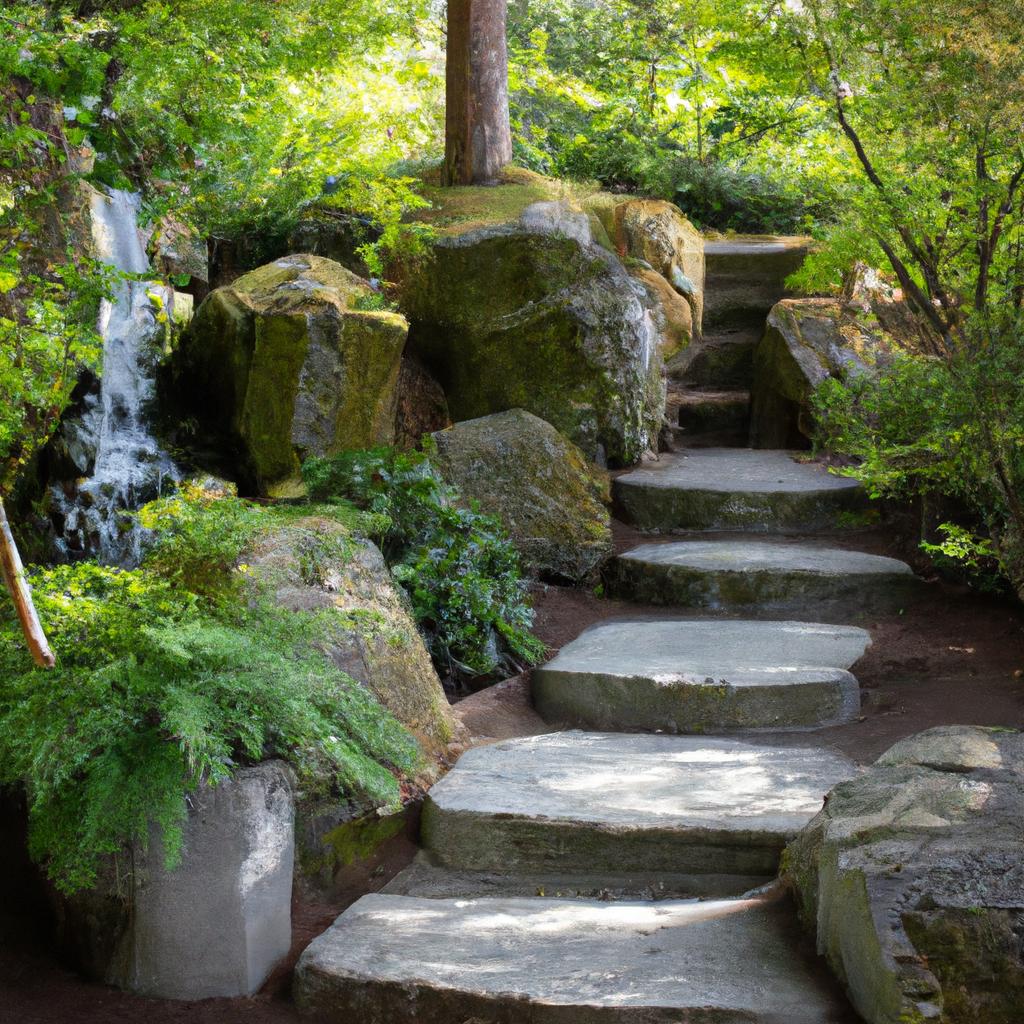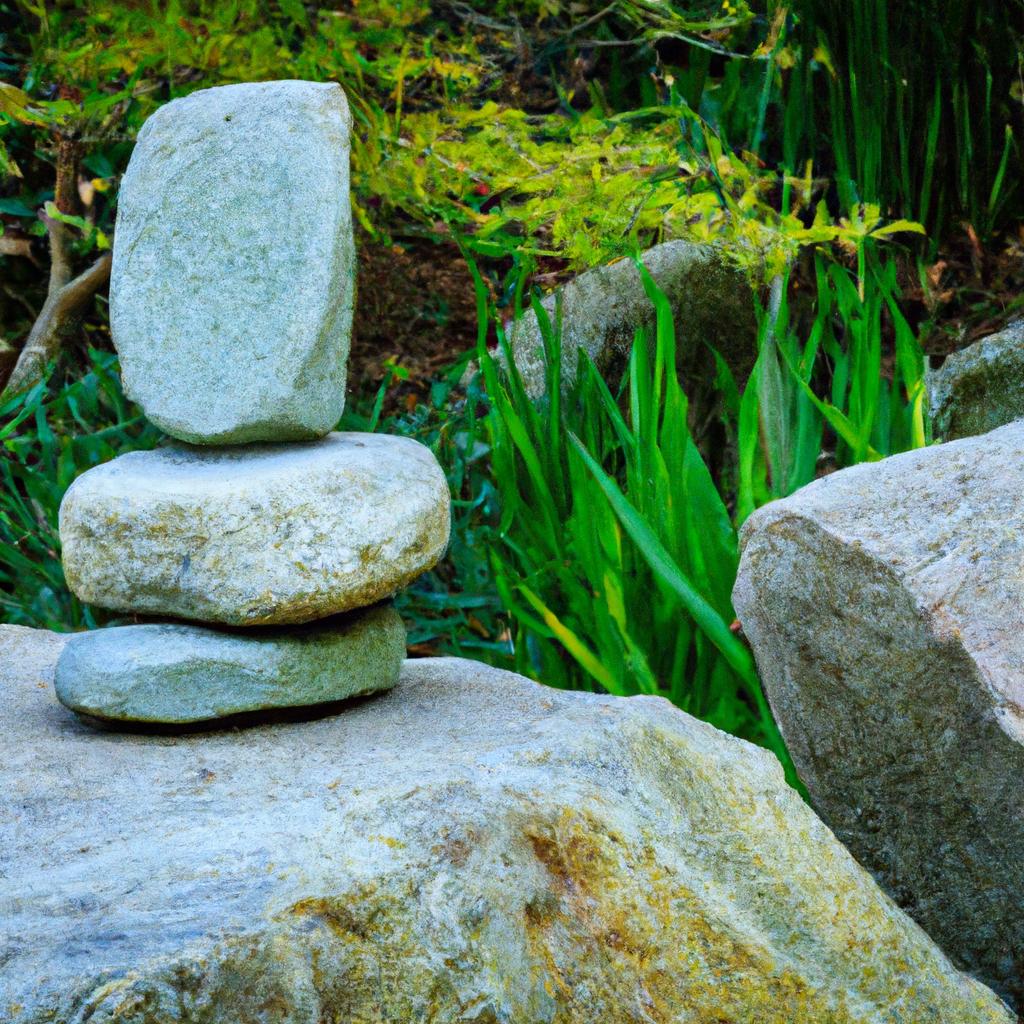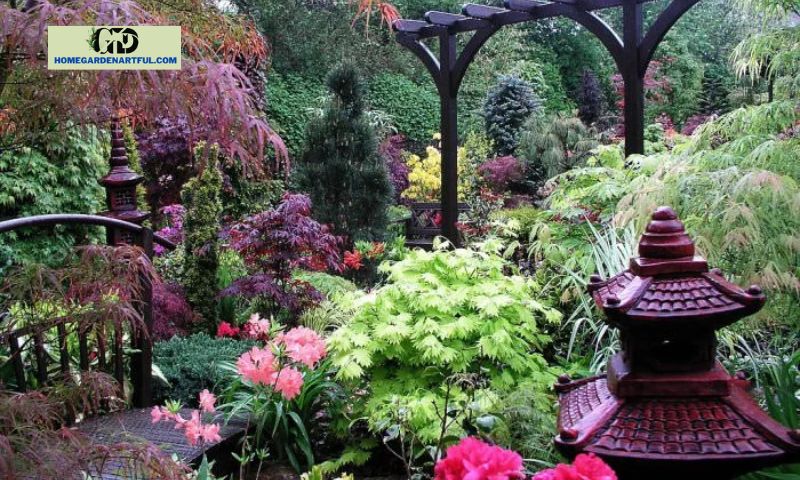What is the japanese feng shui garden? Have you ever wondered how to transform your outdoor space into a haven of serenity and balance? Look no further than the enchanting world of Japanese Feng Shui gardens. These gardens are not only aesthetically pleasing but also hold a deeper meaning rooted in the principles of Feng ShuIn this article, homegardenartful.com will explore the art of designing a Japanese Feng Shui garden and how it can enhance the energy and ambiance of your outdoor sanctuary.
Japanese Feng Shui Principles and Their Connection to Gardens
Feng Shui, an ancient Chinese philosophy, emphasizes the harmonious flow of energy, or “qi,” to promote balance and well-being in our surroundings. The Japanese have embraced this philosophy and incorporated it into their garden designs, creating spaces that nurture the mind, body, and spirit. By understanding the principles of Japanese Feng Shui, we can transform our gardens into places of tranquility, healing, and rejuvenation.
Creating a Harmonious and Balanced Outdoor Space
A Japanese Feng Shui garden is a masterpiece that blends nature, symbolism, and design elements to create a harmonious and balanced outdoor space. By carefully arranging the elements, such as water features, stones, plants, and pathways, we can establish a sense of equilibrium and serenity. These gardens provide a sanctuary where one can escape the chaos of daily life, reconnect with nature, and find inner peace.
Remember, a well-designed Japanese Feng Shui garden is not just visually appealing; it also influences the energy flow within the space. By incorporating the five elements of wood, fire, earth, metal, and water, we can create a harmonious environment that nourishes both the senses and the soul. So, let’s embark on this journey together and unlock the secrets of the Japanese Feng Shui garden, where tranquility and balance await.
Principles of Japanese Feng Shui Garden Design

Incorporating the Five Elements
When designing a Japanese Feng Shui garden, one of the fundamental principles is the incorporation of the five elements: wood, fire, earth, metal, and water. Each element holds symbolic significance and contributes to the overall balance and energy flow within the garden.
Wood: Represented by plants, trees, and wooden structures, the wood element signifies growth, vitality, and flexibility. Integrating lush greenery and carefully selecting foliage that aligns with the garden’s energy can bring a sense of vibrant life to the space.
Fire: Symbolizing passion, transformation, and illumination, the fire element can be represented through the use of candles, lanterns, or even a small fire pit. Adding these elements strategically can infuse the garden with warmth and create a captivating ambiance.
Earth: Grounding and stability are embodied by the earth element. Incorporating rocks, stones, or earthenware in the garden design not only adds visual interest but also anchors the energy, providing a solid foundation for the space.
Metal: The metal element represents clarity, strength, and precision. Including metal sculptures, wind chimes, or even metal furniture can introduce a refined touch and encourage the smooth flow of energy throughout the garden.
Water: Water symbolizes tranquility, abundance, and the flow of life. Integrating water features such as ponds, fountains, or small streams not only adds a soothing element but also enhances the overall energy flow within the garden.
Creating Balance and Harmony
In Japanese Feng Shui garden design, creating a sense of balance and harmony is of utmost importance. The arrangement of elements should be intentional and thoughtfully executed to promote a visually pleasing and energetically balanced space. Consider the following guidelines:
- Symmetry and Asymmetry: Striking a balance between symmetrical and asymmetrical elements can create a visually appealing and harmonious layout. A symmetrical garden design offers a sense of order and stability, while asymmetry adds a touch of natural spontaneity and visual interest.
- Yin and Yang: Incorporating the principles of yin and yang, the complementary forces of feminine and masculine energies, can further enhance balance in the garden. Balancing soft and hard textures, dark and light colors, and curved and straight lines can create a harmonious environment.
Enhancing Energy Flow with Natural Materials
To optimize the energy flow within a Japanese Feng Shui garden, it is vital to use natural materials and textures. Embrace the authenticity of nature with:
- Organic Materials: Utilize materials such as wood, stone, bamboo, and natural fibers to create a grounded and organic feel. These materials harmonize with the surroundings and promote a connection to the earth.
- Textural Variety: Incorporate a range of textures, from smooth stones to rough bark, to create visual interest and stimulate the senses. The interplay of different textures can evoke a multisensory experience, enhancing the garden’s energy flow.
By adhering to these principles, we can design a Japanese Feng Shui garden that exudes balance, harmony, and a deep connection with nature. So, let’s move forward and explore the captivating elements and materials that bring these gardens to life.
Elements of a Japanese Feng Shui Garden

Water Features: Enhancing the Flow of Energy
Water is an essential element in Japanese Feng Shui gardens, symbolizing life, purity, and tranquility. Incorporating water features such as ponds, waterfalls, or streams not only adds a soothing ambiance but also enhances the energy flow within the space. The sound of running water creates a sense of calmness, while the reflections on the water’s surface evoke a feeling of serenity. By strategically placing water features, we can invite positive energy and create a harmonious environment.
Stones and Rocks: Symbolism and Balance
In Japanese culture, stones and rocks hold deep symbolism and are carefully chosen and placed within the garden. These natural elements represent stability, strength, and permanence. Large rocks symbolize mountains, while smaller stones embody islands. The arrangement of rocks in a Japanese Feng Shui garden is not arbitrary but follows a specific technique called “ishigumi.” This technique ensures a balance between yin and yang energies, creating a harmonious landscape that mimics nature’s beauty.
Plants and Trees: Energizing the Space
Plants and trees play a vital role in a Japanese Feng Shui garden, bringing life, color, and positive energy. Each plant is chosen based on its energy and symbolism. For instance, bamboo represents resilience and flexibility, while cherry blossoms symbolize beauty and the transient nature of life. By carefully selecting and arranging these plants, we can infuse the garden with vibrant energy and create a connection between nature and ourselves.
Pathways and Bridges: Guiding Energy Flow
Pathways and bridges serve as important elements in a Japanese Feng Shui garden, guiding the flow of energy and creating a sense of movement within the space. Curved paths encourage a gentle flow of energy, while bridges symbolize transitions and connections. Whether made of stone, wood, or other natural materials, these pathways and bridges add structure and allow us to explore the garden, experiencing its beauty from different angles.
In the next section, we will delve into the use of colors and materials in Japanese Feng Shui gardens, uncovering their significance and impact on the overall energy of the space. Stay tuned as we continue our journey through the enchanting world of Japanese Feng Shui gardens.
Colors and Materials in Japanese Feng Shui Gardens
Importance of Color Symbolism in Japanese Culture
Colors hold significant meaning in Japanese culture, and this symbolism extends to Japanese Feng Shui gardens. Each color represents different energies and emotions, influencing the overall ambiance of the garden. For example, vibrant red symbolizes energy and vitality, while calming blues and greens evoke tranquility and harmony. By understanding the symbolism behind colors, we can strategically incorporate them into our garden design to create the desired atmosphere and promote positive energy flow.
Selecting Materials that Promote Tranquility and Balance
In addition to colors, the choice of materials in a Japanese Feng Shui garden is essential to foster a sense of tranquility and balance. Natural materials, such as wood, stone, and gravel, are commonly used to create a harmonious connection with nature. These materials not only blend seamlessly with the surroundings but also carry their own symbolic meanings. Wood represents growth and vitality, while stone symbolizes strength and stability. By thoughtfully selecting and arranging these materials, we can create a space that resonates with our desired energy and promotes a peaceful atmosphere.
Incorporating Traditional Japanese Elements
To infuse an authentic touch into your Japanese Feng Shui garden, consider incorporating traditional Japanese elements. Bamboo, with its graceful presence, symbolizes flexibility and resilience. Incorporating bamboo into fences, screens, or planters adds a sense of elegance and natural beauty to the garden. Lanterns, another quintessential element, not only provide gentle illumination but also represent enlightenment and spiritual guidance. By incorporating these traditional elements, we pay homage to the rich Japanese culture while enhancing the energy flow and aesthetics of our garden.
As we explore the world of colors and materials in Japanese Feng Shui gardens, we discover the profound impact they have on our well-being and the overall ambiance of the space. By utilizing color symbolism, selecting materials wisely, and incorporating traditional elements, we can create a garden that not only soothes the senses but also uplifts the spirit. So, let’s embark on this creative journey and infuse our Japanese Feng Shui garden with colors, materials, and elements that resonate with our intentions and aspirations.
Arranging and Maintaining a Japanese Feng Shui Garden
Tips for Creating a Visually Pleasing and Energetically Balanced Space
Arranging the elements in a Japanese Feng Shui garden requires careful thought and consideration. Here are some tips to help you create a visually pleasing and energetically balanced space:
- Balance the elements: Incorporate the five elements of wood, fire, earth, metal, and water in your garden design. Place them strategically to achieve a harmonious balance. For example, you can position a water feature, like a tranquil pond or flowing fountain, in the northern or eastern area of your garden to represent the water element.
- Use symbolism: Choose plants, rocks, and other elements that hold symbolic meaning in Japanese culture. Cherry blossoms symbolize beauty and renewal, while bamboo represents strength and flexibility. By incorporating these symbols, you infuse your garden with positive energy and deeper significance.
- Create pathways and focal points: Design pathways that guide the flow of energy throughout your garden. Curved pathways encourage the free movement of qi, while bridges act as connectors between different areas. Additionally, consider adding focal points, such as a well-placed stone lantern or a carefully positioned tree, to draw attention and create a sense of harmony.
Regular Maintenance Practices to Keep Your Garden in Optimal Condition
To ensure your Japanese Feng Shui garden remains in optimal condition, regular maintenance is essential. Here are some practices to keep in mind:
- Prune and trim: Regularly prune and trim your plants to maintain their shape and vitality. Remove dead or overgrown branches to encourage healthy growth and preserve the garden’s aesthetic appeal.
- Weed control: Regularly inspect your garden for weeds and remove them promptly. Weeds disrupt the flow of energy and detract from the garden’s overall beauty. By keeping them under control, you allow positive energy to thrive.
- Water and fertilize appropriately: Provide your plants with the necessary water and nutrients they need to flourish. Be mindful of each plant’s specific requirements and adjust watering and fertilization accordingly. Overwatering or underfeeding can disrupt the garden’s balance.
Seasonal Considerations and Adjustments to Harmonize with Nature’s Cycles
As the seasons change, so too should your Japanese Feng Shui garden. Consider these seasonal adjustments to maintain harmony with nature’s cycles:
- Spring: Embrace the renewal of spring by planting vibrant flowers and blossoming trees. Add pops of color and fresh scents to invigorate your garden. Ensure your water features are clean and functioning optimally to symbolize the flow of life.
- Summer: Provide shade and shelter for your garden during the hot summer months. Consider adding pergolas, shade sails, or strategically placed trees to protect delicate plants and create a comfortable environment for relaxation.
- Autumn: Celebrate the changing colors of autumn by incorporating warm hues into your garden. Consider planting trees or shrubs that display vibrant foliage. Clear fallen leaves regularly to maintain a tidy and balanced space.
- Winter: Embrace the tranquility of winter by designing your garden to withstand the colder months. Incorporate evergreen plants and structures with clean lines to create an elegant and serene atmosphere. Ensure that pathways and bridges are safe and accessible during icy conditions.
By adjusting your garden according to each season, you harmonize with nature’s cycles and create a dynamic and ever-evolving space. Remember, a well-maintained garden reflects the care and attention you put into both its physical appearance and energetic balance.
Benefits of a Japanese Feng Shui Garden
A Japanese Feng Shui garden is not merely a visual spectacle; it offers numerous benefits that go beyond its aesthetic appeal. Let’s explore some of the advantages that a Japanese Feng Shui garden can bring into your life.
Creating a Serene and Peaceful Environment
Imagine stepping into a garden filled with lush greenery, soothing water features, and the gentle rustling of leaves. A Japanese Feng Shui garden provides a serene and peaceful environment, allowing you to escape the stresses of daily life. It serves as a sanctuary where you can unwind, meditate, and find solace in nature’s embrace.
Enhancing Positive Energy Flow
The principles of Japanese Feng Shui focus on optimizing the flow of positive energy, or “qi,” within a space. A well-designed garden can channel this energy in a balanced and harmonious manner, promoting a sense of well-being and vitality. By incorporating elements such as flowing water, carefully placed rocks, and strategically chosen plants, a Japanese Feng Shui garden encourages the smooth circulation of positive energy, fostering a vibrant and uplifting atmosphere.
Promoting Overall Well-being
Being in nature has been scientifically proven to have numerous benefits for our physical and mental well-being. Japanese Feng Shui gardens provide the perfect setting to reconnect with nature and reap its healing properties. Spending time in these gardens can reduce stress, improve mood, boost creativity, and enhance overall health. From the calming sound of water to the grounding sensation of walking on pebbled pathways, each element in a Japanese Feng Shui garden contributes to your well-being.
Appreciating the Beauty of Nature
Japanese culture has a profound appreciation for the beauty of nature, and this sentiment is reflected in their gardens. A Japanese Feng Shui garden allows you to immerse yourself in the enchanting world of cherry blossoms, vibrant foliage, and meticulously pruned trees. It provides a space for you to connect with the natural world, fostering a deep sense of awe and gratitude for the wonders of creation.
In conclusion, a Japanese Feng Shui garden offers a multitude of benefits, from providing a serene and peaceful environment to enhancing positive energy flow and promoting overall well-being. It is a living testament to the beauty and wisdom of Japanese culture, inviting us to slow down, find balance, and appreciate the harmony of nature. So, why not embark on this journey and create your own Japanese Feng Shui garden, where tranquility and beauty intertwine?


